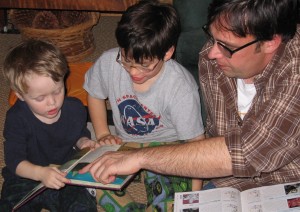 Last fast Sunday, as I was listening to the testimonies borne over the pulpit, I noticed a pattern. Over and over people were testifying about how the gospel brings us real and lasting (even eternal) happiness. I felt something within me agree with the sentiment, but at the same time, a question of “why” came to my mind. Why is it that the gospel of Jesus Christ allows us to feel joy and happiness both here on earth, and in the eternities? Over the next month, a few different situations lead to something really clicking for me; something that helped me answer this question of “why” and “how” the principles that we are taught in church (and hopefully in our homes and here at BYU as well) are essential in our own personal pursuit of happiness.
Last fast Sunday, as I was listening to the testimonies borne over the pulpit, I noticed a pattern. Over and over people were testifying about how the gospel brings us real and lasting (even eternal) happiness. I felt something within me agree with the sentiment, but at the same time, a question of “why” came to my mind. Why is it that the gospel of Jesus Christ allows us to feel joy and happiness both here on earth, and in the eternities? Over the next month, a few different situations lead to something really clicking for me; something that helped me answer this question of “why” and “how” the principles that we are taught in church (and hopefully in our homes and here at BYU as well) are essential in our own personal pursuit of happiness.
“Men are that they might have joy”
In 2 Nephi 2:27, we read, “Adam fell that men might be; and men are, that they might have joy.” This scripture says a great deal about our purpose. We were created, and sent here to earth because our Creator wants us to have eternal joy. How amazing is that? In this life, and in the life to come, we are meant to have happiness, and Heavenly Father’s mission involves helping us to achieve that happiness. However, that doesn’t mean that life is all fun and games!
Why is this? Throughout my life, I have learned that it’s because true happiness doesn’t come from simple ease. Having everything go right for us all the time, or not having anything bad happen in our lives does NOT automatically result in happiness. Many people in today’s world will argue that it does – hedonism (the theory that pleasure—and therefore lack of pain—is the highest good and proper aim of human life) is an ideology that plagues our society and is prevalent particularly in the media that we consume every day. Knowing that we are meant to be happy, and also better understanding the idea that Heavenly Father allows things to happen in order to increase our eternal happiness can give us hope. We must trust that everything we go through is part of God’s plan, and takes place so that we “might have joy.”
Becoming
If we are meant to be happy, how does our Heavenly Father help us get there? This summer, I read a self-help book entitled The Happiness Project (Rubin, 2009). In this book, the author invited the reader (me) to write down a list of the things that they enjoy doing. As I went over my list, I started noticing a pattern. A majority of the items I had written down involved personal improvement or developing my talents: performing in a play or musical, drawing portraits, reading books, trying new recipes, any type of learning, singing or playing the piano, yoga, swimming, scripture study. As I pondered about why this was, the thought came to me that one of the reasons we are here on earth is to BECOME.
We are here to reach our full potential. To become like our Heavenly Father and Mother, and to one day to live as they do: as perfect beings who can continue progressing, learning, growing, and creating eternally. Our spirits, who have existed for longer than we can comprehend, know this! Deep down, we know and understand that we are meant to become, and our spirits rejoice as we come closer to reaching this potential. This is why trials and difficulties can add to our happiness. As we overcome adversity, we grow and come further along in our progression towards perfection. Similarly, most of the growing that we do in this life involves getting outside of our comfort zone and trying new things. Developing our talents takes courage, practice, and at times, failure. Remembering that we are meant to become can give us the strength to get back up and try again.
Belonging
A pattern also emerged in the remaining items on my personal happiness list. I realized that anything that didn’t have to do with my own personal becoming, had to do either with helping someone else become, or connection and nurturing a relationship. Serving others, teaching, snuggling with my husband, spending time with my family; all of these things have to do with BELONGING. We know that from the time before we came to this earth, we existed as a family—God’s family.
We did not exist or function in isolation, and we are not meant to do so now. This is why Heavenly Father has organized us into family units here on earth, and why His plan involves being with our families for eternity! This is also why He has provided us with prayer, and his Holy Ghost: two ways that we can personally connect and improve our relationship with Him. “And the Lord God said, It is not good that the man should be alone.” (Genesis 2:18) We are meant to connect and foster lasting relationships here on earth, and forever into the future. Because of this, it also brings us joy to help others come closer their potential, and make choices that will also allow them to be with us forever. Understanding this can help us to reach out to others, and to strive to make real human connections with the people around us. We are more likely to forgive and to give others the benefit of the doubt. We can begin to see others as our Father does, and help encourage them (as well as learn from them) in their own journey to become and to belong.
Wickedness NEVER was happiness
Whenever I think about happiness, I cannot help but think about the scripture Alma 41:10 “Behold, I say unto you, wickedness never was happiness.” When we think about this scripture in the context of becoming and belonging, it makes perfect sense. Sinning, or doing anything that separates us from God, has serious consequences that involve stopping our progress (literally damning us) and keeping us from our eternal relationships. It cuts us off from our potential, and from living forever with those that we love. Although it may feel good at the moment, wickedness can never truly bring us real and eternal joy. Heavenly Father has given us commandments and guidelines that will help keep us all on the right track in our journey to become and belong. They help accomplish His mission of bringing us eternal happiness and joy.
Ever since I had these realizations relating to my personal pursuit of happiness, I have been able to find the principles of becoming and belonging in every one of my endeavors. Understanding that the things that will help me find true joy and happiness are those things that help bring me closer to my potential as a child of God, along with bringing me closer to those around me, has brought focus, purpose, and peace to my life. I know that as we all strive to become more and more like our Heavenly Parents, and work on developing connections with those that we are blessed to come in contact with, we will have more success in making the world a better and happier place, and we will all be one step closer to carrying the joy that we feel now through to the eternities.
Written by: Rian Gordon







